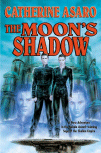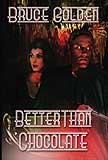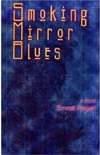
The Moon's Shadow, by Catherine Asaro
Book Review by Kate Savage
Have you read this book?
Catherine Asaro's latest novel, The Moon's Shadow, reads like a historical thriller that just happens to occur in the distant future (2277). It is the latest installment in Asaro's Skolian Empire Saga. The Moon's Shadow occurs just after the stalemated conclusion of the devastating Radiance War fought between the Skolians and the Eubian Concord (a.k.a. Trader Empire).
The Eubian Traders are ruled by an elite caste, the Aristos. Aristos are the product of a genetic engineering project gone that attempted to create the perfect telepath. Only the most powerful telepaths can control the ancient and mysterious machinery that creates the Kyle web. The Kyle web allows for instantaneous communications over vast distances and as such, is a major military advantage. In the natural order, telepaths of such strength (psions) are exceedingly rare because the recessive genes for them are usually paired with lethal genes. The one known family that consistently produces such telepaths is the handful of descendants of the Ruby Dynasty. These descendants are also co-rulers in the Skolian Empire.
The few thousand Aristos rule an empire in which each owns whole worlds of people. The Aristos are outwardly perfect. They possess superior strength, intelligence and physical attractiveness. Yet they are as warped as the Roman Emperor Caligula is, for the attempt to make them telepathic created instead people who feel addictive joy in the pain of tortured telepaths, or "providers." The ultimate possession is a psion of the Ruby Dynasty and the Traders think nothing of sending pirate fleets to raid the Skolians. In the last days of the Radiance War, they captured Eldrin, the consort to a member of the Ruby Dynasty. Here they have a priceless provider and a possible key to the creation of a Eubian controlled Kyle web.
The story starts with an exchange of prisoners. In the aftermath of the Radiance war, the Skolian Kyle web was destroyed and the Eubian emperor, Jaibriol II, died with no known heir. Fortunately, or not depending on your viewpoint, a boy of seventeen comes forward, offering his genetic material as proof positive of his claim to the throne. In exchange, the Eubians must free Prince Eldrin to a neutral third party. The exchange is made and Eldrin's hellish experience is over.
Who is this Jaibriol III? It turns out he is the son of the late Emperor Jaibriol II and Sauscony. Sauscony was a member of the Ruby Dynasty and military leader for the Skolians. In secret, Jaibriol II's grandfather (Jaibriol I) had manipulated the family bloodline by having a child with a provider. He named that child as his legitimate heir in hope that a future descendant would be an Aristo controlled psion capable of creating a Kyle web. Jaibriol II's father did likewise and the result was that Jaibriol II was a psion. As fate would have it, Jaibriol II and Sauscony met, fell in love and successfully hid for many years - - long enough to create a family.
In the end, Jaibriol II was isolated from Sauscony, discovered by the Eubians, and unhappily installed on the throne. After hiding the children, Sauscony returned to the Skolian military. Both of Jaibriol III's parents were killed in the Radiance war. Jaibriol III takes it upon himself to free his uncle Eldrin by trading places with him. Into the nest of vipers he goes, needing to hide his true nature and heritage. Otherwise, he faces a life of unending torture and potentially could be used as a Key to help the Eubian military renew -— and win —- the next war. He also wishes to broker a lasting peace between the Eubians and Skolians as a tribute to his parent's legacy. What we know of our own history is that we often destroy our own heroes and visionaries. In Asaro's other books, there are no sacred cows and not all the heroes live. Jaibriol III's fate is the suspense that drives the tale.
The Moon's Shadow is a solid enough story to be enjoyed as a stand-alone novel but reading others in the series is helpful. There is a sense that there is a fair amount of action happening off stage but even that slight unevenness meshes well with the destruction of interstellar communications and the constraints the Eubians work within because of their lack of a Kyle web. For the reader, events are explained clearly and the story is deftly kept going.
All that makes a saga work is in The Moon's Shadow. This story spans generations to remind us that while solving individual problems people make history. Individuals create functional or dysfunctional relationships along the way depending on their strengths or flaws. Like any saga worth its salt, this one has villains, loved ones and others worthy of loyalty. There are a number of romances but they are more restrained than in other books in the series. This thriftiness works well for the central romance given the culture it occurs in. Normally, Asaro has unique and compelling scientific threads in her novels but the science is scant in this one. The lack may be missed by some of her fans but the story does not suffer from its absence.
The most satisfying elements are the drama and conflicts in the story. Asaro has done an excellent job of writing characters of depth and balance that are often obscured by shadow. Her use of language between characters illuminates the Eubian culture with a pleasing economy. I found the overall feel of the story reminiscent of Robert Grave's I Claudius. Jaibriol III is a man of vision, intelligence, and integrity. He is fundamentally sane and compassionate. He is thrust into the internal machinations of a world gone mad and is expected to be the glue to keep it together. From the outside, the Eubian economy and culture appear preciously close to collapse under the weight of its own decadence. I was also reminded of stories of Jews having to pass in Nazi Germany, their day-to-day existence always in question because of the risk of discovery. Lastly, we are reminded of one of the conflicts of the American Civil War -- what is to be done to resolve two radically opposed moralities in which one side believes the right to enslave others is self-evident and the other side considers slavery to be a crime against humanity? For all the weighty themes in The Moon's Shadow, it is a fast and compulsive read.
The Eubian Traders are ruled by an elite caste, the Aristos. Aristos are the product of a genetic engineering project gone that attempted to create the perfect telepath. Only the most powerful telepaths can control the ancient and mysterious machinery that creates the Kyle web. The Kyle web allows for instantaneous communications over vast distances and as such, is a major military advantage. In the natural order, telepaths of such strength (psions) are exceedingly rare because the recessive genes for them are usually paired with lethal genes. The one known family that consistently produces such telepaths is the handful of descendants of the Ruby Dynasty. These descendants are also co-rulers in the Skolian Empire.
The few thousand Aristos rule an empire in which each owns whole worlds of people. The Aristos are outwardly perfect. They possess superior strength, intelligence and physical attractiveness. Yet they are as warped as the Roman Emperor Caligula is, for the attempt to make them telepathic created instead people who feel addictive joy in the pain of tortured telepaths, or "providers." The ultimate possession is a psion of the Ruby Dynasty and the Traders think nothing of sending pirate fleets to raid the Skolians. In the last days of the Radiance War, they captured Eldrin, the consort to a member of the Ruby Dynasty. Here they have a priceless provider and a possible key to the creation of a Eubian controlled Kyle web.
The story starts with an exchange of prisoners. In the aftermath of the Radiance war, the Skolian Kyle web was destroyed and the Eubian emperor, Jaibriol II, died with no known heir. Fortunately, or not depending on your viewpoint, a boy of seventeen comes forward, offering his genetic material as proof positive of his claim to the throne. In exchange, the Eubians must free Prince Eldrin to a neutral third party. The exchange is made and Eldrin's hellish experience is over.
Who is this Jaibriol III? It turns out he is the son of the late Emperor Jaibriol II and Sauscony. Sauscony was a member of the Ruby Dynasty and military leader for the Skolians. In secret, Jaibriol II's grandfather (Jaibriol I) had manipulated the family bloodline by having a child with a provider. He named that child as his legitimate heir in hope that a future descendant would be an Aristo controlled psion capable of creating a Kyle web. Jaibriol II's father did likewise and the result was that Jaibriol II was a psion. As fate would have it, Jaibriol II and Sauscony met, fell in love and successfully hid for many years - - long enough to create a family.
In the end, Jaibriol II was isolated from Sauscony, discovered by the Eubians, and unhappily installed on the throne. After hiding the children, Sauscony returned to the Skolian military. Both of Jaibriol III's parents were killed in the Radiance war. Jaibriol III takes it upon himself to free his uncle Eldrin by trading places with him. Into the nest of vipers he goes, needing to hide his true nature and heritage. Otherwise, he faces a life of unending torture and potentially could be used as a Key to help the Eubian military renew -— and win —- the next war. He also wishes to broker a lasting peace between the Eubians and Skolians as a tribute to his parent's legacy. What we know of our own history is that we often destroy our own heroes and visionaries. In Asaro's other books, there are no sacred cows and not all the heroes live. Jaibriol III's fate is the suspense that drives the tale.
The Moon's Shadow is a solid enough story to be enjoyed as a stand-alone novel but reading others in the series is helpful. There is a sense that there is a fair amount of action happening off stage but even that slight unevenness meshes well with the destruction of interstellar communications and the constraints the Eubians work within because of their lack of a Kyle web. For the reader, events are explained clearly and the story is deftly kept going.
All that makes a saga work is in The Moon's Shadow. This story spans generations to remind us that while solving individual problems people make history. Individuals create functional or dysfunctional relationships along the way depending on their strengths or flaws. Like any saga worth its salt, this one has villains, loved ones and others worthy of loyalty. There are a number of romances but they are more restrained than in other books in the series. This thriftiness works well for the central romance given the culture it occurs in. Normally, Asaro has unique and compelling scientific threads in her novels but the science is scant in this one. The lack may be missed by some of her fans but the story does not suffer from its absence.
The most satisfying elements are the drama and conflicts in the story. Asaro has done an excellent job of writing characters of depth and balance that are often obscured by shadow. Her use of language between characters illuminates the Eubian culture with a pleasing economy. I found the overall feel of the story reminiscent of Robert Grave's I Claudius. Jaibriol III is a man of vision, intelligence, and integrity. He is fundamentally sane and compassionate. He is thrust into the internal machinations of a world gone mad and is expected to be the glue to keep it together. From the outside, the Eubian economy and culture appear preciously close to collapse under the weight of its own decadence. I was also reminded of stories of Jews having to pass in Nazi Germany, their day-to-day existence always in question because of the risk of discovery. Lastly, we are reminded of one of the conflicts of the American Civil War -- what is to be done to resolve two radically opposed moralities in which one side believes the right to enslave others is self-evident and the other side considers slavery to be a crime against humanity? For all the weighty themes in The Moon's Shadow, it is a fast and compulsive read.
| The Moon's Shadow, by Catherine Asaro on Amazon |
The Moon's Shadow, by Catherine Asaro on Amazon

| More Books You Might Like |
Comment on The Moon's Shadow, by Catherine Asaro
| Comments on The Moon's Shadow, by Catherine Asaro |
| There are no comments on this book. |




